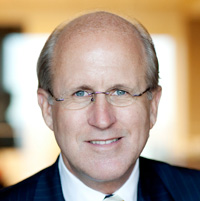The American presidential election is only two months away but neither Mitt Romney nor Barack Obama has been open about their proposed spending cuts and tax changes. They must be more specific about their financial plans
Now that it seems clear that Governor Romney and President Obama will both receive the official nominations for the US presidential election by their respective parties the general election campaign is in full swing.
Fortunately, the issues of the economy, jobs and fiscal responsibility are likely to be at the top of the agenda in the campaign and the upcoming debates. However, we need to make sure that these issues are addressed in a substantive and solutions-oriented fashion so voters can make an informed decision and the winner can claim a ‘mandate’ for action.
It seems clear that this presidential election is one of the most important the country has faced in many years. Our nation faces the dual challenge of a ‘fiscal cliff’ at the end of 2012 and large and growing structural deficits in the years ahead. Therefore, it’s time for the candidates to get serious about fiscal issues and be much more specific regarding their proposed plans of action.
The election is only two months away, but neither Obama nor Romney has provided adequate information regarding their proposed spending reductions and tax actions. Both have mentioned reducing federal spending, but neither candidate has a specific plan about how these spending cuts would be achieved.
Romney advocates spending cuts but has not provided details about what programmes or agencies would be the most impacted, or what impact these cuts would have on the poverty level and those most in need.
To his credit, Romney has shown political backbone to call for both Social Security and Medicare reforms, and has provided more specific proposals in connection with these important social insurance programmes. However, he vows to boost defence spending even though defence agencies already have a gigantic budget and the Defense Department has become a bloated bureaucracy.
President Obama has campaigned for more tax revenue, but seems to want to build on the current complex, outdated and uncompetitive tax system rather than engaging in comprehensive reform.
He has focused on the ‘Buffett rule’, which calls for the wealthiest to pay their ‘fair share’ of taxes. However, the issue of tax fairness is broader in scope than just issues relating to the wealthy. It must also consider other aspects such as: Should over 40% of tax filers not pay any federal income tax? How can two people with roughly the same income end up paying very different amounts in taxes?
Obama also wants more spending in connection with basic research and infrastructure, which are important but should be part of a more comprehensive and integrated fiscal reform effort. In addition, any such investments must be properly designed and effectively implemented, which was not the case with much of his $800bn plus stimulus programme.
To climb out of our over $70trn federal financial hole we will need to reduce spending and raise additional revenue through comprehensive tax reform. Our federal tax code is too complex and needs to be restructured to eliminate many of the deductions, exclusions, credits and other tax expenditures while also lowering the marginal tax rate.
In my view, there should be at least a 3-1 ratio of spending reductions to revenue increases over time. However, when and how best to achieve the needed reforms raises important economic, moral and political questions.
It is important that registered voters, in general, and the debate moderators, in particular, be knowledgeable about these issues and the candidates’ plans. To help, the Comeback America Initiative has developed The Serious 7: Serious Questions for Serious Candidates. This is a guide voters can use throughout the campaign season and outlines questions to help ensure that candidates for federal office address the key areas of reform in a substantive and solutions-oriented fashion.
It is time for the American people to unite and demand action from our elected representatives in connection with our fiscal and other key sustainability challenges. Our country's and our families’ futures are dependent on them doing so.






